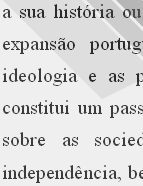

................................
For a long century, stretching from the late 19th century to the last quarter of the 20th century, profound political changes, doctrinal and philosophical complexities, national and international conflicts, violent political, social and professional divergences of relevant national figures coexisted alongside this mythology, not diminishing but rather reinforcing the country's theoretical and ideological unity around Portuguese colonial values and plans.
Many different personalities participated in this multifaceted ideological construction. From Oliveira Martins, author of a vigorous reflection on Portuguese nation-building, a member of the Paris Institute of Anthropology and undoubtedly the most brilliant representative of Social Darwinism in Portugal, to the republicans Norton de Mattos and Ferreira Diniz, even to the workers and agents of the Estado Novo [New State], such as Armindo Monteiro, Salazar, Adriano Moreira and those who opposed the dictatorship such as Henrique Galvão and Cunha Leal. Many individuals contributed with their specific skills to consolidate the negativity of the colonised and the civilising force of the coloniser, proceeding to frame the production of knowledge. "The so-called "civilised natives" (...) as all the colonialist sociologists have acknowledged, are nothing more (...) than grotesque caricatures of white men."
With rare exceptions (...), the "civilised native" retains the mentality of the primitive, barely concealed by the wording, gestures and clothing, copied from the European", stated Vicente Ferreira ("Alguns aspectos da política indígena de Angola” [“Some aspects of the indigenous policy of Angola"], 1946, 220), a former governor of Angola, expressing the collective Portuguese appraisal of the Africans, which was based on the conviction of a cultural difference reinforced by a unique genetic heritage that not even the status of assimilated could change.
But in the mid-20th century and the 1960s, marked by the colonial war, the need to modernise the 'civilising effort', a formula dear to Salazar, translated into the strengthening of white colonisation and the recourse to Freyre's Lusotropicalism to justify the uniqueness of Portuguese colonialism.
